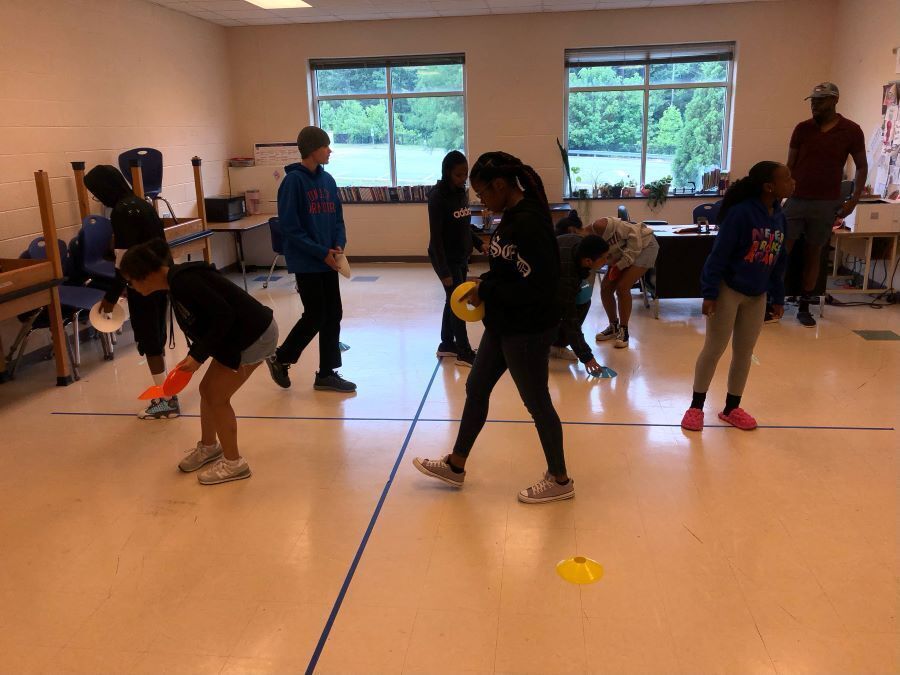
During the first two weeks of launching Operation Xcel Summer Camps, teachers at the Hairston, Southwest, Jamestown, and Jackson Middle Schools delivered impactful teaching strategies that made learning fun for the students who participated. Such learning lasts throughout one's lifetime. Operation Xcel teachers understand an invaluable theory when teaching middle school students. Teaching middle school students is more than teaching students to pass the end-of-grade (EOG) tests only. Daniels, Hamby, and Chen (2015) argue that every middle-school educator who wants to see students succeed in learning must remember that positively impacting student success goes beyond testing and that learning involves more than just answering questions.
Daniels provides insight into the inquiry/technology project she developed to cause middle school students to interact more consciously and deliberately with the books she assigned them to read and with one another. Daniels engaged her students in a discussion about the books throughout their reading, posing questions about the emotions of the key figures in the stories with which the students could relate. Fear, jealousy, and popularity are some of the emerging topics that the students discussed from the reading that they could relate to themselves. After discussing the reading, Daniels challenged the students to write personal blogs about their feelings related to the characters, the characters’ feelings, and outcomes using computers. The students read their blogs during class, facilitating peer discussion and providing Daniels with the direction she should go in their next class meetings. The peer interaction helped the students to think critically about the story and its inferences and judgments even about one another. Before long, positive peer interaction increased as the students asked one another questions about the readings or how to spell certain words and shared experiences that routinely occur among middle and high school students. The more the students wrote their blogs, the greater they became “absorbed in reading, writing, and communicating with each other.” The students showed more positive attitudes towards reading and willingness to participate in class by the end of the project. Consequently, their academic performance saw a marked improvement. Technology was not the focal point of student learning. Instead, Daniels et.al. (2015) found that technology was the background tool that facilitated the students’ growth in their reading “comprehension, writing, and attitude toward learning.”
The teachers at Operation Xcel grasp the concept of student engagement in learning. They use creativity in their teaching presentations, demonstrating to students that learning is not simply absorbed from a book's black-and-white pages. Operation Xcel teachers walk out our vision and core values by “creating a strong foundation for the development of lifelong learners.”
A student in Mrs. Van DeVenter’s English and Language Arts class at Jamestown’s Rise 9 two-week camp describes learning during the Summer Camp as fun, making her want to learn more. The student expressed her dismay at learning during the school year because she says it is as though she is being forced to learn something rather than making it fun to learn. This statement is remarkable because it comes from a student studying Shakespeare in an ELA class, which is usually far from fun learning! The students in Mrs. Van DeVenter’s class will never forget how to identify the key elements of the story to prepare to write about what they read because Mrs. Van DeVenter made learning about one of Shakespeare’s plays fun and engaging.
In another class, Mr. Ollison taught students about chemical reactions by making Smores. The students learned that chemical reaction results are permanent and irreversible. It is impossible to revert a melted and singed marshmallow to its original state. Can you imagine these students as parents teaching their children how to make Smores? I imagine that each time they make Smores or roast marshmallows these students will remember when their Summer of 2024 Science class was fun. Who knows? Mr. Ollison’s students may teach their children about chemical reactions from the Smores-making activity.
The third and final example is from Mr. Reed’s Math class, where he used colored tape to outline 4 quadrants on the classroom floor. He gave the students a list of ordered pairs and a colored disc, tasking the groups of students with identifying quadrants on a coordinate plane by plotting ordered pairs. The groups had to identify the location of a point relating to the point’s location along the x-axis (the first value of the ordered pair) and the y-axis (the second value of the ordered pair), (x, y). The students used the outlined quadrants as “life-size human graphing” walking the diagram to find the corresponding place point of their list of ordered pairs. The students then placed their respective disc colors on their specific points on the grid. The team that finished first and got the most correct answers won and were awarded XCEL bucks. Now that sounds a lot like fun learning! (Mr. Reed's class can be seen in the image attached to this blog.) Can you imagine these students as parents helping their children solve math problems at their kitchen table? (Oops, I meant on the kitchen floor!)
Gallup’s Creativity in Learning report (2019) indicates that teachers who regularly provide creative learning activities say that their students “are more likely than other teachers to say their students exhibit valuable cognitive traits… are highly engaged, confident problem-solvers who can think critically, retain what they learn and have a deep interest in the subject matter”. Operation Xcel students are destined to be world changers among their professional colleagues and peers because of their emerging critical thinking skills and the ability to articulate and demonstrate what they and their children are learning using real-life examples!
Students learn best when teachers facilitate fun, engaging learning and create peer dialogue. While other students may remember the beach trip they took for the Summer, they may not be able to remember specific aspects of the trip by recreating the moment like students in Mrs. Van Deventer’s, Mr. Reed’s, or Mr. Ollison’s classes. It would be difficult to forget how to analyze the elements of a story, and how to solve a complicated math problem or a chemical reaction throughout the student’s lifetime, not because of the project or experiment. Rather, it is unlikely that the student will forget because the students were highly engaged in the projects and experiments and controlled their outcomes. What better way to learn than hands-on, interactive engagement in one’s learning? Operation Xcel teachers may never realize how instrumental in their students' lives their use of creative strategies in their lessons is, but the students are more likely to recall how Operation Xcel teachers taught as the students repeatedly experience the examples Operation Xcel teachers used to teach!

